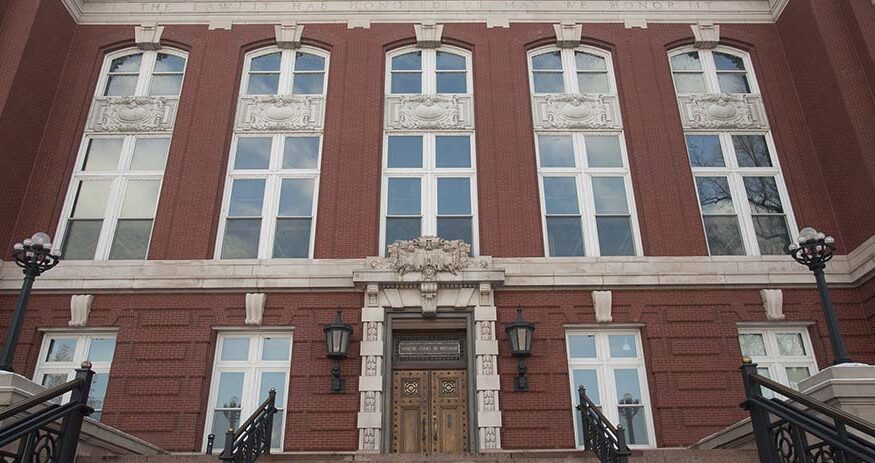Man jailed for five months without preliminary hearing goes before state supreme court
By: Bridgetower Media Newswires//January 12, 2024//
Man jailed for five months without preliminary hearing goes before state supreme court
By: Bridgetower Media Newswires//January 12, 2024//
A criminal defendant who was jailed for five months without receiving a preliminary hearing is asking the Missouri Supreme Court to hold that prosecutors’ intent to present a case to a grand jury does not constitute good cause to delay such hearings, which should otherwise be held within 30 days of arrest.
The Missouri Public Defender’s Office, representing defendant Lamar Lamont Woods, claims this is a systemic issue. The St. Louis Circuit Attorney’s Office is charging felonies by complaint but never intends to participate in preliminary hearings in cases based on civilian witnesses, Assistant Public Defender Brendan Kottenstette said during oral arguments held on Jan. 4.
Instead, prosecutors will ask the court for a continuance until it can receive a true bill from a grand jury. But waiting for a grand jury is not enough to establish the “good cause” required to postpone a preliminary hearing, Kottenstette argued, describing the prosecutors’ motions as “legal fiction.”
“Because it’s been allowed to continue, proceeding with the preliminary hearing, preparing for it and bringing witnesses is something they can simply elect not to do,” Kottenstette said.
Underscoring the problem with that, he said, is that 37 percent of cases that were delayed for this reason during the past two fiscal years were eventually dismissed, according to the Office of State Court Administrator. 15 of the 1,232 defendants whose cases never moved forward in that period died in jail while waiting, according to the Missouri Public Defender’s Office for St. Louis. Many others lost jobs, income or housing.
But that left at least one judge concerned that the issue might never be dealt with, as similar cases are likely to have moved on before the Supreme Court could deal with a dispute.
“Aren’t we always going to be in this situation, that something’s going to happen, that, by the time parties get here or to another appellate court to get relief, that something will have happened and the court then isn’t able to act and provide guidance as to what the term ‘good cause’ means?” Judge W. Brent Powell asked Goodwin.
But Goodwin argued the Supreme Court has almost unlimited power or discretion to supervise the conduct and procedures of lower courts, which he said it could do on its own accord outside of this case. Additionally, he argued that mandamus is inappropriate here because judges have discretion to determine if good cause has been established.
Kottenstette argued that an exception to mootness exists and could be applied here because this is a matter of general importance capable of repetition and would evade additional review if the court does not act.
In discussing what role a charge by complaint serves in the criminal justice system, Powell said it is effectively a notice that the state intends to charge an individual with certain offenses before charges are confirmed at the preliminary hearing.
“It’s a request for permission to go to circuit court and, in the meantime, detain the defendant,” Goodwin responded. “There is no procedure to detain a defendant pending a grand jury investigation.”
That response was not well received by Judge Paul C. Wilson.
“Well, but that’s the problem, OK? Because there isn’t. And yet, you’re using — or the allegation is — this policy is using the complaint lane to detain people indefinitely, and the detention is indefinite because the grand jury excuse lasts forever,” Wilson said.
The judge asked if Goodwin would concede that, at some point, the excuse should no longer be good cause, which Goodwin did. But at what point, Wilson asked, to which Goodwin responded that it depends on the case.
Goodwin also pointed out that Judge Dierker did not approve the prosecutors’ motion to continue only because they wanted more time to put the case before a grand jury, but also because the case had already been partially presented to a grand jury and because Woods allegedly presented a danger to the community. Therefore, the question of whether the court can allow continuing only to give more time for the Circuit Attorney’s Office to get an indictment is a question that is not before the Supreme Court in this case, he said.
The is State ex rel.Woods v. Dierker, SC100369
Legal News
- Lawyers burn midnight oil studying Title IX revisions
- 70 years after Brown, school integration stymied
- Wisconsin man gets 15 years in prison for Door County bar fire that killed two
- Noncitizen voting, already illegal in federal elections, becomes a centerpiece of 2024 GOP messaging
- Wisconsin election officials fear voter confusion over 2 elections for same congressional seat
- ICC prosecutor seeks arrest warrant for Israeli and Hamas leaders, including Netanyahu
- Up in smoke: Workers remove dozens of apparent marijuana plants from Wisconsin Capitol tulip garden
- The Senate filibuster is a hurdle to any national abortion bill
- Bones found in 1989 in a Wisconsin chimney identified as man who last contacted relatives in 1970
- WisGOP convention spotlights abortion, higher education, immigration and national security
- NAACP: No consequences for UWM Pro-Palestinian protesters shows ‘bias’ and ‘privilege’
- New complaints filed against Northwestern over Kenosha football hazing scandal
WLJ People
- Power 30 Personal Injury Attorneys – Russell Nicolet
- Power 30 Personal Injury Attorneys – Benjamin Nicolet
- Power 30 Personal Injury Attorneys – Dustin T. Woehl
- Power 30 Personal Injury Attorneys – Katherine Metzger
- Power 30 Personal Injury Attorneys – Joseph Ryan
- Power 30 Personal Injury Attorneys – James M. Ryan
- Power 30 Personal Injury Attorneys – Dana Wachs
- Power 30 Personal Injury Attorneys – Mark L. Thomsen
- Power 30 Personal Injury Attorneys – Matthew Lein
- Power 30 Personal Injury Attorneys – Jeffrey A. Pitman
- Power 30 Personal Injury Attorneys – William Pemberton
- Power 30 Personal Injury Attorneys – Howard S. Sicula













